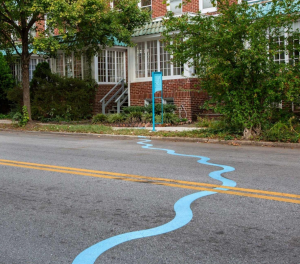Towson Talisman’s School Survival Guide: AP Edition
AP classes. Whether you’re taking your first one ever, or you’re taking six at the same time (we all know someone that crazy), there’s a common theme: they’re a lot of work.
Sure, by the end of the year you may be an expert in the art of taking history notes or writing an infinite amount of essays, but that’s after months of trial and error. What you need is information before-hand, strategies on the best way to survive the class and ace the test.
So without further ado, here is your all-access guide to AP classes, featuring advice from both students and teachers alike. Not every course is here, but take advantage of this rare moment of free time away from studying to read how to limit stress and succeed in your class.
AP World History
If you don’t already love Genghis Khan, you will by the end of the year. Usually the first AP class you’ll take at Towson, World History with Ms. Waters will take you through, well, the history of the world, from the first civilization to the 21st century. It doesn’t just stop at memorizing facts, however. You should also be prepared to make connections between different cultures, which is a key part of the AP test.
And then, of course, there are the notes. Naturally, the best advice is to do a little each night so you don’t have to do them all at once. No matter how much you like history, no one can stand reading about Medieval Europe or even the Mongols for three hours straight.
AP US History
From one history to another… Fortunately, AP United States History can be abbreviated to APUSH, while world history would just become APWH (not helpful). Another upside of APUSH is that while you still have weekly notes, they’re in the form of a packet full of questions, so you don’t have to take notes from scratch.
Like AP World, this class requires more than just knowing your history.
“The key to obtaining success on the AP US History exam,” explains Mr. Hoefler, “is one’s ability to understand and apply the nine historical thinking skills. Although it’s important to know historical content, it’s even more important to be able to analyze documents, contextualize and make historical connections across periods of time, and use relevant historical evidence to formulate historical arguments.”
So while you should know what the War of 1812 was over or what James Buchanan did (which was really nothing), you should also be aware of how to combine this information with documents and other historical events (yes, this is a big part of the test).
Mr. Hoefler also advises that you participate in class discussions, as students who do so “find the most satisfaction in enjoying the class and obtain the most success on the AP exam.”
AP Calculus AB and BC
Here’s a question: What do Calculus AB and BC have in common? That’s right, the letter B! The letters actually stand for sections of calculus, so both classes share one section. In fact, on the Calculus BC exam, you receive a Calculus AB sub-score (a score for just the questions on topics from Calculus AB). Basically, if you don’t like Calculus AB, don’t take Calculus BC.
You should also make sure that you are doing the homework (probably not what you wanted to hear) for practice and review. The concepts tend to build on each other, so it’s key that you fully understand one topic before moving on to the next.
Finally, here is Calculus AB teacher Mr. Dalsimer’s take on the class:
“Calculus is the study of the infinite and the infinitesimal. To understand calculus is to give one’s self a means to understand the universe on all scales. But you can’t teach an elephant calculus, so you would be best served to share your peanuts.”
If you understand that, you should have no problem with calculus.
AP English 11 and 12
First, it’s probably helpful if you understand the difference between the two classes. English 11, or English Language and Composition, focuses on rhetorical analysis and writing skills. On the other hand, English 12, or English Literature and Composition, revolves more around literary criticism and the different characteristics of both poems and stories.
English is also a class where the work can really build up if you’re not careful to stay ahead.
“Keep up with your work,” recommends senior Caitlin Pattanashetti, “because once you procrastinate and get behind, it’s super hard to catch up, and it creates lots of unneeded stress!”
Finally, AP English 11 teacher Mr. Alford shares a piece of advice that many English teachers believe in:
“Read. Read often. Read a wide variety of material. Read things you disagree with. Become better informed about the world outside your own experiences. Well-read, informed, knowledgeable people perform better on the test, particularly with the synthesis and argument essays. It will also make you a more interesting person!”
AP Physics
Physics is hard, no matter what level you take. If the textbook or the Internet may not be able to help you with a particular problem, what do you do?
“Message or meet with me before you get overwhelmed. Ten minutes can make you a better student,” says Mr. Jochmans. This can also be applied to any class – never hesitate to ask questions!
He also suggests that you “always check what assumptions are made, or you made, in a given situation.” And remember how I mentioned under the AP Calculus sections that the concepts build on each other? Well, that applies here too.
Mr. Jochman’s final word of advice?
“Listen to ‘I’m Gonna Make a Man Out of You’ from Mulan. Good inspiration.”
AP Psychology
The best recommendation?
“Read the book. It’s actually pretty useful.” – Mr. Olson
There will be topics that you are expected to know about, even if you don’t go over them in class. That’s where the book comes in. Whether you take notes or buy your own copy of the book and highlight in it, you should be keeping up with the chapters as they correspond with the class.
AP Biology and AP Chemistry
Labs. That’s the reason why these two classes are grouped together. So how do you write a good lab report?
“The key to writing a successful lab report is to keep yourself organized and put in as much detail as possible (often in the form of data) to help illustrate your point,” says senior Yuzhu Shi, who has taken both classes.
She also suggests that people read the book instead of solely relying on videos from Khan Academy and Crash Course.
“The textbook does a much better job of helping you understand what’s really going on, [as] long as you’re willing to spend some time with it,” she explains.
Final Words of Advice
If you need more specific advice for any class, the best idea is to ask your teacher. Don’t expect to understand everything right away; you’re taking a college-level course, after all!
Most importantly, don’t take an AP class just for the sake of taking an upper-level course. Take classes you like, because you’ll be more motivated to actually do the work.
Now take a deep breath, relax, and get ready to earn a five on all your APs!















